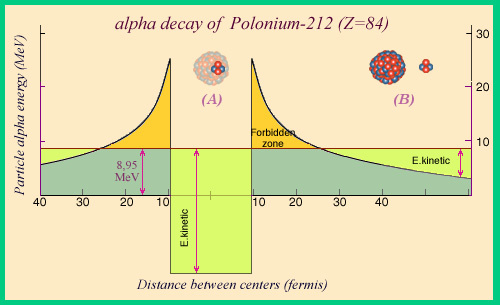Well then, Matt, I guess you know quite a bit about this stuff. I knew a good amount of what you said but you really clarified some things for me – so, just to clarify, let’s say during alpha decay, the alpha particle exists in a wavefunction – so by Shrodinger’s equation, the location it ‘probably exists in’ can exist extend to outside of the area that the strong force cannot ‘control’, and so there’s a low (but non-zero) chance it is actually located there. So, given enough time, the alpha particle will actually be in that location (i.e. quantum tunnelling, which I actually just learned today) and therefore decay has successfully occurred. Did I get it right?
So, here is the contention:
After 1 second, approximately half of them have now jumped ship and now call themselves Lead 208. What caused those 50 to abandon their roots and join a new element? Why those 50 and not the other 50? Nothing caused these 50 to change. They are no different from the 50 who didn’t change. There is nothing that one can point to as to what caused this to occur. Sure, we understand what physical process had to occur for this to happen (i.e. Quantum tunneling), but there was nothing that started the decay, nothing that egged it on, no extra force acting up on it. This is very different from non-Quantum phenomena which makes the beginning of the universe extra sticky–because quantum effects would have been extremely important.
As I said earlier, I just don’t know why those 50 and not the other 50. However, I did make a point – if it was, indeed, entirely causeless and random, then why are the decay rates always identical? Using your same analogy again, if I ran an experiment the first time, 50 atoms would decay in one second and 50 wouldn’t. Then, if I ran the exact same experiment with 100 different Polonium 212 atoms, in one second, again exactly 50 would decay and 50 wouldn’t. So, while I do not know any expletive cause, perhaps no one does, it appears non-random on some level, otherwise we would expect decay rates that have absolutely no continuity with each other.
I mentioned earlier that this could be due to pure statistics. Let me know if I fumble. Let’s say, hypothetically, that the chance an alpha particle will be outside of the ‘no-go zone’ of the strong force is 1/20 every hour (note: these odds are all made up). And let’s say I had 100 atoms. So, in 1 hour, by pure chance exactly 5 atoms will have undergone alpha decay. Although there is absolutely nothing distinguishing these 100 atoms each other, and nothing distinguishing the 5 particles that underwent decay from the 95 that didn’t, we realize that this is not a causeless process and statistics can always predict what will happen. So, in fact, if this reasoning follows, we don’t really need to postulate any sort of causeless events taking place. Every event in the particles that underwent decay have known causes, and every event in the particles that did not undergo decay do not have any logical conundrums either to engage with. So where’s the problem? Let me know if I should clarify my thoughts a bit.
By the way, since you’re a physics guy, know a good physics book I should get my hands on? I learned recently that Hawking’s bestseller is available for free online, so I’ll read that once I get through my current backlog of reading (currently going through We Have Found The Messiah by Michael Vicko Zolondek, a recent academic monograph on Jesus’ self-messianic understanding in light of his group-social context).
